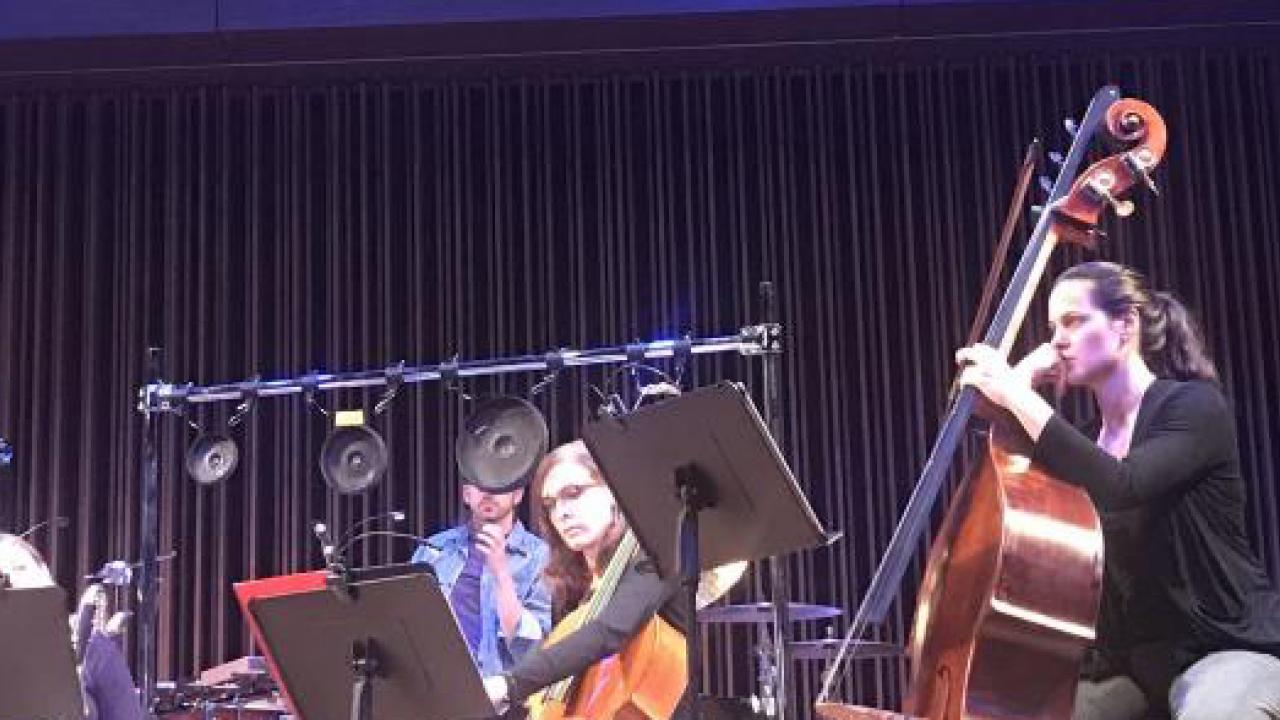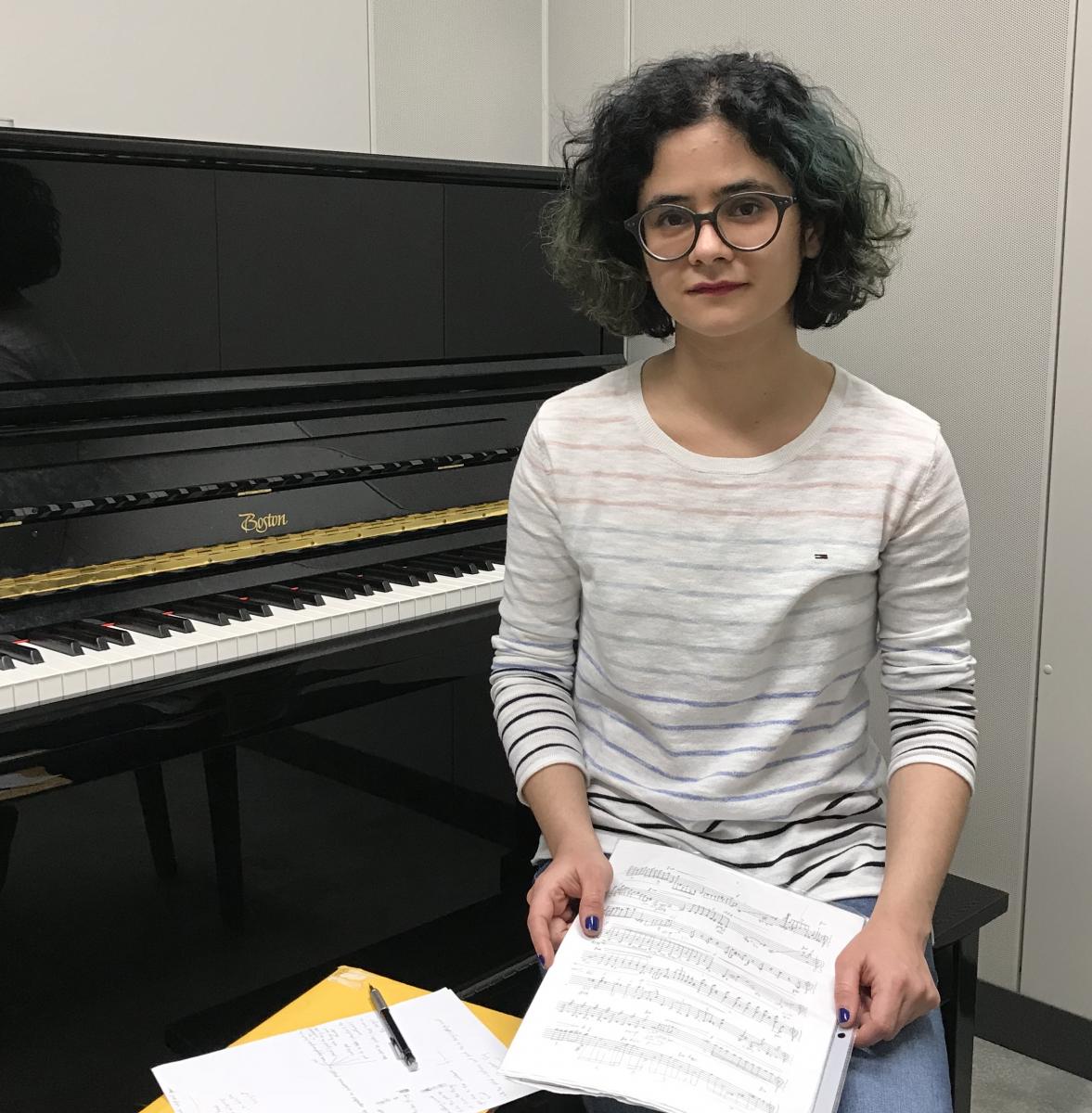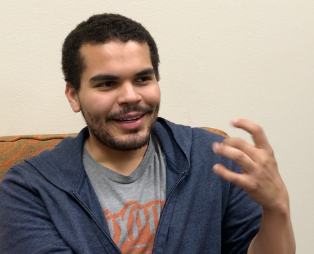
UC Davis Composition Students’ Music Heard Far and Wide
When doctoral music composition students at UC Davis hear their music played for the first time, they hear it played by professionals who are champions of new music with years of performance experience.
“It’s an absolute luxury to have these professional musicians play our work,” said student Jonathan Favero. “In many programs you have to beg, borrow and steal to find players.”
During the 2018 calendar year alone, student pieces have been premiered on campus by the Empyrean Ensemble, violinist Miranda Cuckson, electric guitar/percussion duo The Living Earth Show, Ensemble Dal Niente, the Lydian String Quartet, the Brooklyn Art Song Ensemble and the St. Louis Symphony Orchestra.
“There’s no shortage of performance opportunities, especially for a research program, and that’s something that’s attractive to students,” said Kurt Rohde, Jan and Beta Popper Professor of Music and graduate advisor for composition and theory in the College of Letters and Science's Department of Music. “They can take it as far as they want to.”
The composers write for an expansive range and combination of musicians — string quartets, solo harp, percussion groups, wind ensembles, piano, singers, electric guitar, and many other variations. During rehearsals, the performers and students engage in dialogue aimed at transforming scores into musical reality.
“They’re right here to give you feedback on what will and what won’t work, but the uber-professionals we get here will have figured it out,” said student Daniel Godsil. “I'm free to talk more poetically, macro and big-picture.”
Opening Opportunities
The benefit of having professionals play student composers’ music doesn’t end with the first performance at UC Davis’ Ann E. Pitzer Center recital hall. Collaborating with professional players from around the country, the composers become part of a contemporary music world network.
Harpist Jennifer Ellis premiered Shirazi’s “Prisoner of the Sand” at UC Davis, then played it twice in Minnesota. Violinist Miranda Cuckson gave the first performance of her “longing for a distant memory…” on campus, then commissioned Shirazi to write a new piece. Pianist Sarah Cahill, who Shirazi met at a concert featuring other students' pieces, selected her as one of 40 female composers from the past 500 years for “The Future is Female” series.

After performing Favero’s music as a member of Ensemble Mise-en on campus, flautist Kelley Barnett commissioned him to write a piece, “Meditation on King,” that she premiered last year in New York. Godsel’s “Aeropittura,” premiered on campus by the Empyrean Ensemble, was later performed by Earplay New Chamber Music in San Francisco. Compositions by Josiah Catalan, performed by violinist Cuckson and Ensemble Mise-en, went on to performances in New York. During the last two seasons, the Left Coast Chamber Ensemble premiered five UC Davis student pieces in San Francisco and Berkeley.
Wide Range of Backgrounds
The doctoral program in music composition and theory has been around for nearly a quarter of a century, but in recent years has garnered much more attention. Because the program is in composition and theory, it opens doors for a wider range of career options, especially in academia. The department’s strong musicology and ethnomusicology offerings also often overlap with the students’ interests and add to their expertise. The music department has a two-year-old, state-of-the-art, 400-seat recital hall that can provide quadraphonic and surround sound, along with lighting and multimedia capabilities.
“They write lots of music, take classes, do research, serve as teaching assistants, and some perform as well,” said Laurie San Martin, a composer and chair of the music department. “It’s amazing how much they get done. There are a lot of opportunities here and that’s something the students are hungry for.”
The program’s dozen or so students and core faculty come from many backgrounds with just as many approaches to music making.

“None of the professors’ music sounds the same; none of the students’ music sounds the same,” said recent graduate Chris Castro. “There’s a lot of diverse music and ideas about music, a lot of freedom, but real connectivity too.”
Castro trained as a performer (double bass) at The Julliard School and has extensive experience playing in orchestras. Godsil began playing guitar in heavy metal bands at 13, then spent a decade writing and playing music for commercials and churches. Favero says, “Pretty much all the music I do now is driven by political and social concerns.” Phil Acimovic, another 2018 graduate, has a background as a performer of Javanese gamelan (percussion ensemble) and led the music department’s gamelan. Shirazi studied piano in her native Iran and composition and theory in Turkey.
The department’s composition professors have active professional lives and often connect with potential students at concerts and conferences. Shiraz met Rohde at a music festival in Istanbul. Other students have learned about the program from alumni. Favero studied at Illinois State University with Martha Horst, who earned her doctorate at UC Davis. Castro attended a concert where he heard a piece by program alumnus Hendel Almetus that “floored” him. Almetus “spoke highly of the program,” Castro said.
“You need to have people who really want to do this,” said San Martin, “and we get those students.”
About Graduate Studies
Graduate Studies at UC Davis includes over 100 dynamic degree programs and a diverse and interactive student body from around the world. Known for our state-of-the-art research facilities, productive laboratories and progressive spirit – UC Davis offers collaborative and interdisciplinary curricula through graduate groups and designated emphasis options, bringing students and faculty of different academic disciplines together to address real-world challenges.
UC Davis graduate students and postdoctoral scholars become leaders in their fields: researchers, teachers, politicians, mentors and entrepreneurs. They go on to guide, define and impact change within our global community.
For information on Graduate Studies’ current strategic initiatives, visit the Graduate Studies strategic plan page.
